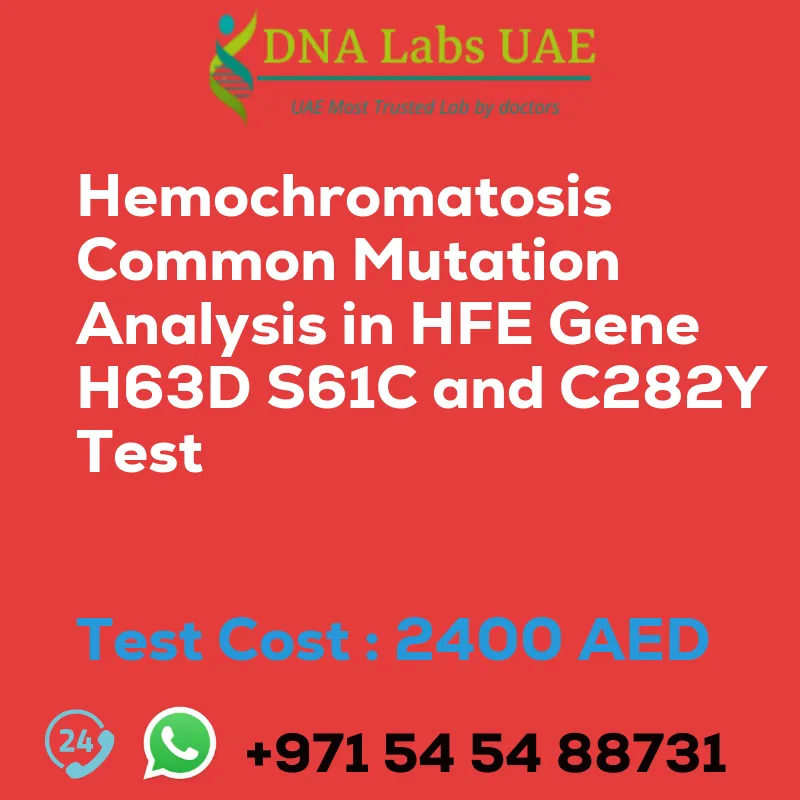Hemochromatosis Common Mutation Analysis in HFE Gene H63D S61C and C282Y Test
Test Cost: AED 2400.0
Symptoms, Diagnosis, and Test Details
Hemochromatosis is a genetic disorder characterized by excessive absorption and accumulation of iron in the body. The most common form of hemochromatosis is caused by mutations in the HFE gene. There are three common mutations in the HFE gene that are associated with hemochromatosis: H63D, S61C, and C282Y.
H63D Mutation
This mutation involves a substitution of the amino acid histidine with aspartic acid at position 63 in the HFE protein. The H63D mutation is the most common mutation associated with hemochromatosis after the C282Y mutation. It is believed to be a milder form of the disease and is often found in combination with other mutations.
S61C Mutation
This mutation involves a substitution of the amino acid serine with cysteine at position 61 in the HFE protein. The S61C mutation is less common than the H63D mutation and is also considered to be a milder form of hemochromatosis.
C282Y Mutation
This mutation involves a substitution of the amino acid cysteine with tyrosine at position 282 in the HFE protein. The C282Y mutation is the most common and most severe mutation associated with hemochromatosis. It is responsible for the majority of cases of hereditary hemochromatosis and is typically associated with higher levels of iron accumulation.
Genetic testing for these mutations in the HFE gene can be performed to identify individuals at risk for developing hemochromatosis. It can also help in the diagnosis of the disease in individuals with symptoms or abnormal iron levels. However, it is important to note that not all individuals with these mutations will develop hemochromatosis, as other genetic and environmental factors can influence the development and severity of the disease.
Test Components and Method
Components: EDTA Vacutainer (2ml)
Price: AED 2400.0
Sample Condition: Peripheral blood
Report Delivery: 7-10 days
Method: Sanger Sequencing
Doctor and Test Department
Doctor: Gynecologist
Test Department: Genetics
Pre Test Information
Hemochromatosis Common Mutation Analysis in HFE Gene (H63D, S61C & C282Y) can be done with a doctor’s prescription. Prescription is not applicable for surgery and pregnancy cases or people planning to travel abroad.
| Test Name | Hemochromatosis Common Mutation Analysis in HFE Gene H63D S61C and C282Y Test |
|---|---|
| Components | EDTA Vacutainer (2ml) |
| Price | 2400.0 AED |
| Sample Condition | Peripheral blood |
| Report Delivery | 7-10 days |
| Method | Sanger Sequencing |
| Test type | Genetics |
| Doctor | Gynecologist |
| Test Department: | |
| Pre Test Information | Hemochromatosis Common Mutation Analysis in HFE Gene (H63D, S61C & C282Y) can be done with a Doctors prescription. Prescription is not applicable for surgery and pregnancy cases or people planing to travel abroad. |
| Test Details |
Hemochromatosis is a genetic disorder characterized by excessive absorption and accumulation of iron in the body. The most common form of hemochromatosis is caused by mutations in the HFE gene. There are three common mutations in the HFE gene that are associated with hemochromatosis: H63D, S61C, and C282Y. 1. H63D mutation: This mutation involves a substitution of the amino acid histidine with aspartic acid at position 63 in the HFE protein. The H63D mutation is the most common mutation associated with hemochromatosis after the C282Y mutation. It is believed to be a milder form of the disease and is often found in combination with other mutations. 2. S61C mutation: This mutation involves a substitution of the amino acid serine with cysteine at position 61 in the HFE protein. The S61C mutation is less common than the H63D mutation and is also considered to be a milder form of hemochromatosis. 3. C282Y mutation: This mutation involves a substitution of the amino acid cysteine with tyrosine at position 282 in the HFE protein. The C282Y mutation is the most common and most severe mutation associated with hemochromatosis. It is responsible for the majority of cases of hereditary hemochromatosis and is typically associated with higher levels of iron accumulation. Genetic testing for these mutations in the HFE gene can be performed to identify individuals at risk for developing hemochromatosis. It can also help in the diagnosis of the disease in individuals with symptoms or abnormal iron levels. However, it is important to note that not all individuals with these mutations will develop hemochromatosis, as other genetic and environmental factors can influence the development and severity of the disease. |








